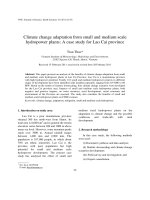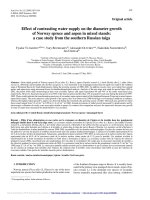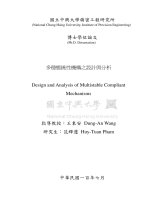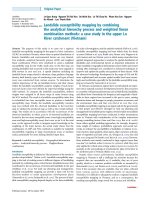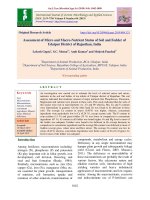Economic management and analysis of potato cultivation: A case study of Agra district (U.P), India
Bạn đang xem bản rút gọn của tài liệu. Xem và tải ngay bản đầy đủ của tài liệu tại đây (212.69 KB, 6 trang )
Int.J.Curr.Microbiol.App.Sci (2019) 8(2): 525-530
International Journal of Current Microbiology and Applied Sciences
ISSN: 2319-7706 Volume 8 Number 02 (2019)
Journal homepage:
Original Research Article
/>
Economic Management and Analysis of Potato Cultivation: A case study of
Agra district (U.P), India
A. Singh1, R. Singh2, Anurag2 and Ranjana3*
1
Department of Agricultural Economics, College of Agriculture, RBS College,
Bichpuri, Agra, India
2
Department of Agricultural Economics, Sanskriti University, Mathura, India
3
Department of Agricultural Economics, Mangalayatan University, Aligarh, India
*Corresponding author
ABSTRACT
Keywords
Cost, Returns,
Potato, Agra,
Cultivation,
Output/input ratio
Article Info
Accepted:
07 January 2019
Available Online:
10 February 2019
Economic study of potato production of 44 growers grouped into small (20), medium (14)
and large (10) from Agra district showed the overall cost of cultivation to be Rs. 140303.7
per farm and Rs. 78657.98 per hectare. Among all the inputs, per hectare value of potato
seed was 25%, the human labour was 14%, the total variable cost was 78%, the total fixed
cost was 22% per ha and the overall total cost C3 of potato was Rs. 154334.07 per farm
and Rs. 86523.78 per hectare. The gross income received by farms with the overall
average of Rs. 188370. The analysis of efficiency of potato production under different
categories of farms showed the overall cost of production of potato was Rs. 292.3 per
quintal. The overall output/input ratio was 1:2.39, being 1:3.42, 1:2.61 and 1:2.21 on the
small, medium and large farms, respectively. Thus, it could be concluded that with an
investment of one rupee in potato cultivation the small, medium and large farmers earned
Rs. 3.42, Rs. 2.61 and Rs. 2.21, respectively.
provides higher returns and promote value
added agribusiness enterprises.
Introduction
India is the 2nd largest Potato producer of the
world, production 45.95 mt during 2014-15
(Directorate of Economics and Statistics,
2016) and productivity 16-19 t/ha. In Uttar
Pradesh, Agra as the major Potato market
offers excellent opportunity for producing
quality Potato of 58103 hectares from area of
15 development blocks with production of
1310700 tonnes (Dept. of Agriculture and
Cooperation, Agra). The high value cash
crops in the state is gaining momentum as it
Materials and Methods
The present study is based on primary and
secondary data information collected by the
survey method of 44 Potato growers (20
small, 14 medium and 10 large farmers) of the
Sonari village from the Bichpuri block. The
final data was examined for resource
endorsement and relationship between cost
and returns of the Potato cultivation based on
525
Int.J.Curr.Microbiol.App.Sci (2019) 8(2): 525-530
farm size groups, standard cost and income
measurements to work out profitability of
potato cultivation. The concepts used in costs
and returns of potato cultivation were as
follows.
FBI = GFI – Cost A
Cost concepts
Results and Discussion
Cost A1: Material cost + bullock/ tractor
charges + interest over working capital. Cost
A2: Cost A1+ rent paid for leased land.
Cost of cultivation
Farm investment income: The sum total of net
farm income, interest on owned fixed capital
and rental value of land.
The computation of the cost of cultivation is
necessary to determine the relative
profitability of various crops over different
crops. The detailed cost structure of the
Potato cultivation (Table 1) shows overall per
farm total cost of potato cultivation
(Rs.140303.7) varies directly with the farm
size. The percent share of seed cost to the
total cost was as high as 30.2% on medium
farms and as low as 27.54% on small farm
size group. The total variable cost also varies
with the farm size. The proportionate share of
variable cost to the total cost was found
lowest on the large farm size group and
highest in the small farm size group.
Cost B: Cost A2 + interest on the fixed capital
+ rental value of owned land.
Cost C: Cost B + imputed value of family
Labour.
The interest on working capital at 12 per cent
rate for half of the crop period and on fixed
capital was computed as per prevailing
lending rates.
Farm efficiency measures
Gross farm income (GFI): The gross value of
output including by-product priced at farm
harvest rates.
Table 2 reveals that the per hectare items wise
total cost of cultivation (Rs.78657.98) of
potato. Among all the inputs, per hectare
value of seeds of potato alone occupied about
25% to the total cost. Potato being labour
intensive crop, human labour occupies 14% to
the total cost that varies directly with farm
size because of more hired labour employed
on larger farms. The total variable cost
accounted for 78% on overall farms, showing
decreasing trends (80, 80 and 83% to the total
cost on the small, medium and large farm,
respectively) with the farm size. The per
hectare total fixed cost increases as the farm
size increases and was found 22% to the total
cost on overall farms. Expenditure on plant
protection was about 2% of total cost clearly
indicating the least risk taken for crop damage
by insects.
GFI= value of the main product + value of by
product.
Net farm income (NFI): remuneration for the
farmer’s management
NFI = GFI – Cost C2 (farm expenses)
Farm family labour income (FLI): Returns to
family labour
FLI = GFI – Cost B.
Farm business income (FBI): return to labour,
owned land, owned fixed capital and
management.
526
Int.J.Curr.Microbiol.App.Sci (2019) 8(2): 525-530
In nutshell, it can be concluded from the table
that the potato growing farmers invest as
much as they can depending upon the
resources available to them.
respectively. Gross income, farm business
income and family labour income and net
income over cost C1, C2 and C3 vary directly
with the farm size. The cost C3 includes cost
C2 and marginal cost, which is given to the
farmer for managing the entire production
process. All the costs in cost concept vary
directly with the farm size. In all the cases
cost A1 and A2 were the same because no case
of lease-in land was found in the sample. The
overall per hectare total cost C3 of potato
came to the gross income received by
Rs.174461 (small), Rs.188209 (medium) and
Rs.192395 (large) farms with the overall
average of Rs.188370.
Costs and returns
Table 3 indicates that per farm overall total
cost C3 of potato was Rs.154334.07 and
Rs.101846.22 per hectare. Per hectare gross
income received by small, medium and large
farms was Rs.174461.00, Rs.188209.00 and
Rs.192395.00, respectively with an overall
average of Rs.188370. Overall cost of
production of potato was estimated Rs.292.30
per quintal being Rs.204.14, Rs.267.30 and
Rs.316.44 on small, medium and large farms,
Table.1 Per farm item-wise cost of cultivation (in Rs.)
Item
Small
Medium
Large
Overall
Value
%
Value
%
Value
%
Value
%
Family Labour
1521.34
2.79
2086.27
1.6
3134.07
1.04
1878.57
1.33
Casual
5952.42
11.58 12465.11 9.56
31864.74 10.62 11424.9
8.14
Machine Labour
9766.53
19
Seed
14157.14 27.54 39363.64 30.2
Fertilizer & Manure
8532.64
16.6
21831.82 16.75 38225.1
12.73 23921.42 17.04
Plant Protection
716.63
1.39
1698.64
1.19
Operational Cost
40646.09 79.08 99459.12 76.32 218547.2 72.81 101304.7 72.2
Interest on Working
Capital
1219.38
Variable Cost
41865.37 81.45 102442.9 78.61 225103.6 75
104343.8 74.33
Depreciation on Fixed
Capital
410.5
0.07
4132.4
3.17
12993.5
4.32
4635.54
3.3
Interest on Fixed
Capital
953.83
1.85
5270.1
4.04
14545.81 4.84
5628.55
4.01
Land Revenue
45.42
0.08
150
0.11
350
0.11
275.72
0.19
Rental Value
8120
15.79 18312
14.05 47140.5
1570
25420.1
18.11
Fixed Cost
9529.75
18.54 27864.5
21.38 75029.81 24.99 35959.91 25.63
Total cost
51395.12 100
2.37
22014.24 16.89 33037.1
2983.78
1.3
2.28
130307.4 100
527
99680
3575.25
6556.41
11
19851.7
14.14
33.21 42162.12 30.05
2.18
300133.4 100
2065.6
3039.14
1.47
2.16
140303.7 100
Int.J.Curr.Microbiol.App.Sci (2019) 8(2): 525-530
Table.2 Per hectare item wise cost of cultivation (Rs.)
Small
Medium
Large
Overall
Value
%
Value
%
Value
%
Value
%
1673.65 3.28 2198.38 3.05
2459
2.82 1991.76 2.53
5462.8 10.73 8656.22 12.04 11331.65 13.02 9507.99 12.08
8961.21 17.6
10971
15.26 13471.14 15.48 11430.61 14.53
14877.6 29.23 18962.12 23.6
22000
25.3
19000
24.15
Item
Family Labour
Casual
Machine Labour
Seed
Fertilizer
&
8000
15.71 14000.12
Manure
550.8
1.08
1180.2
Plant Protection
Operational Cost 39526.26 77.66 55967.78
Interest
on
1185.78 2.32 1679.03
Working Capital
40711.84 79.99 57646.81
Variable cost
Depreciation on
390.18
0.76
2402.2
Fixed Capital
Interest on Fixed
880.12
1.72 2787.12
Capital
40
0.07
42.4
Land Revenue
8870
17.42
8990
Rental Value
10180.3
20
14221.72
Fixed Cost
50892.14 100 71868.53
Total Cost
19.48
17936
16000
20.34
1.61 1560.12 1.79
77.87 70068.13 80.56
1301.42
59581.9
1.65
75.75
2.75
1787.45
2.27
2102.04
20.62
2.41
80.21 72170.17 82.97 61369.36 78.02
3.34
2752.1
3.16
2210.8
2.81
3.87
2987.1
3.43
2773.71
3.53
0.05
66.77
0.07
304.11
0.39
12.5
9000
10.34
12000
15.25
19.78 14805.97 17.02 17288.62 21.98
100 86976.14 100 78657.98 100
Table.3 Cost of cultivation (in Rs.)
Per Farm Cost Concept
Per Hectare Cost Concept
Cost
Concept
Small
Medium
Large
Overall
Small
Medium
Large
Overall
Cost A1
40800
104639
235313
107376
39468.4
57893
72530
61892.5
Cost A2
40800
104639
235313
107376
39468.4
57863
72530
61892.5
Cost B1
41753.8
109909
249859
113005
40348.5
60680.2
75517.1
64666.2
Cost B2
49873.8
128221
296999
138425
49218.5
69670.2
84517.1
76666.2
Cost d
43275.1
111995
252993
114884
42022.1
62878.5
77976.1
66658
Cost C2
51395.1
130307
300133
140304
50892.1
71868.5
86976.1
78658
Cost C3
56534.6
143338
330147
154334
55981.4
79055.4
95673.8
86523.8
528
Int.J.Curr.Microbiol.App.Sci (2019) 8(2): 525-530
Table.4 Farm business analysis (in Rs.)
Income
concept
Gross
Income
Farm
Business
Income
Family
Labour
Income
Net Income
Over C1
Net Income
Over C2
Net Income
Over C3
Farm
investment
Income
Cost of
Production
Outputinput Ratio
Gross
Income
Per Farm
Per Hectare
Small
Medium
Large
Overall
Small
Medium
Large
Overall
178003
487452
1285704
550032
174461.00
188209
192395
188370
137203.05
383812.97 1050390.98 395697.93 134992.63
130316
119875
126477
128129.22
359230.87 988704.67
411606.87 125242.51
118539
107878
111704
137727.88
375456.6
435148.4
132438.86
125330
844419
121712
126607.88
344114.15 985570.6
409728.3
123568.86
116340
105419
109712
121468.37
380726.70 95557.26
395697.93 118479.65
109154
96721.3
101846
135681.71
187.12
1047256.91 393819.36 133318.98
128118
117415
124486
202.11
169.09
163.4
178.55
204.14
267.3
316..44
292.3
3.46
3.74
4.28
3.89
3.42
2.61.
2.21
2.39
1032711.1
Analysis of costs and returns is of vital
importance both the point of view of evolving
sound production plans and for the
formulation of price policy. The costs and
returns study of a particular crop enterprise
also provides very useful information for
improving the farm efficiency.
share as laborers and manage Rs. So far as
family labour income and farm business
income are concerned potato provides
positive returns to the farmers of all farm size
groups. The output/input ratio was 1:2.39,
being 1:3.42, 1:2.61 and 1:2.21 on small,
medium and large farms, respectively.
Farm efficiency
Based on the above study it can be concluded
that with the investment of one rupee in
potato cultivation small, medium and large
farmers earned Rs.3.42, Rs.2.61 and Rs.2.21,
respectively.
Table 4 reveals that the overall cost of
production of potato was Rs.292.3 per quintal
being Rs.204.14, Rs.267.3 and Rs.316.44 on
small, medium and large farms, respectively.
Net income over cost C2 and C3 was less than
net income over cost C1 in case of all the
sample farmers, which indicates that the farm
family members were not getting their dues
Acknowledgement
The author is highly thankful to R.B.S
College, Bichpuri, Sanskriti University,
529
Int.J.Curr.Microbiol.App.Sci (2019) 8(2): 525-530
Mathura and Mangalayatan University for
providing necessary support to conduct the
research.
Journal of Applied Biology 6(1/2):
121-123
Tripathi, R.S., 1991. Economics of potato
cultivation in the high hills of Uttar
Pradesh. Journal of the Indian Potato
Association 18: 142-146.
Vikalp Sharma, Harbans Lal, Utpalendu
Debnath and Vinay Hatte. 2017.
Economics of Potato Production in
Kangra District of Himachal Pradesh,
India. Int.J.Curr.Microbiol.App.Sci.
6(10): 123-129.
References
Sharma, B., and Tripathi, B.N., 2005.
Economics of potato cultivation in
Allahabad district of Uttar Pradesh.
New Agriculturist 16: 75-79
Sinha, R.P., Singh, U.K. 1996. Economic
analysis of potato cultivation: a case
study of Nalanda district (Bihar).
How to cite this article:
Singh, A., R. Singh, Anurag and Ranjana. 2019. Economic Management and Analysis of
Potato Cultivation: A case study of Agra district (U.P). Int.J.Curr.Microbiol.App.Sci. 8(02):
525-530. doi: />
530
